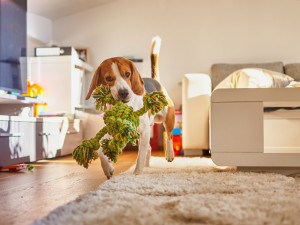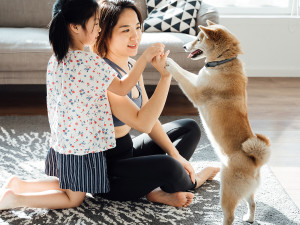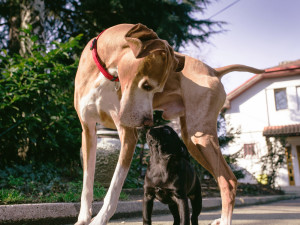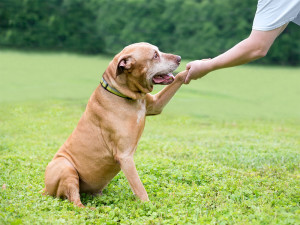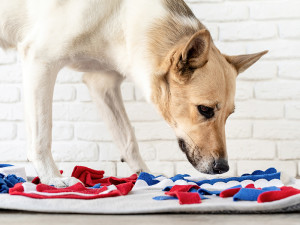“Should I Adopt an Adult Rescue Dog?”
Yes! Shelters are full of good, grown-up doggos. Here’s how to find the perfect match.
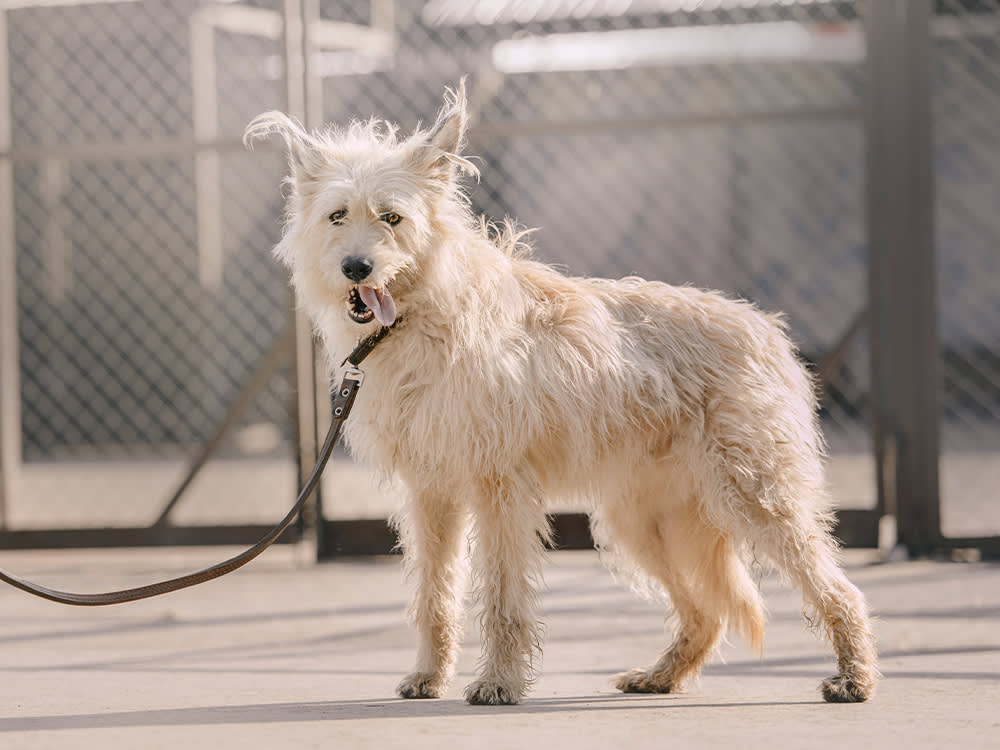
Share Article
Most people adopt puppies, so we want to give an adult shelter dog a forever home. But we are concerned about socialization issues. We hear that the first eight weeks of a dog’s life are so important. Without information about their early life, how do we know if the dog we choose can be trained to be a good family pet?
First, kudos to you — adopting an adult rescue dog is excellent news for canine-kind. It’s true that the experiences dogs have in their first few months of life are very important, but that should not discourage you. Genetics also play a huge role in a dog’s personality, and it’s the interplay between genes and experiences that determines who they become. That interplay takes years to form the individual dogs we know and love. Interestingly, it also means that it’s hard to predict how any puppy will turn out because they have so much developing and living to do before we know what they are really about. With an adult dog, you have a pretty good idea that what you see is what you get.
The takeaway here is that when you go to a shelter to find the right dog for you, you will be meeting adult dogs who are closer than puppies to having the fully formed personality you will live with for the rest of their lives. That said, dogs of every age require some training to become polite canine members of society. With that in mind, don’t worry if a dog you like doesn’t yet have every skill they need.
All dogs need to be is potty trained, and they can learn to greet people without jumping up and to walk comfortably on a leash. Older dogs can easily learn new tricks, and they often have a head start with their training. Many are house trained, and it’s common for adults to know the basics: how to sit, enter a car, wait at the door, or how to shake, for example.

Choose the right pup for you.
Welcoming a dog of any age, no matter what the situation, will always involve some degree of crossing your paws and hoping for the best. Dogs continue to change, and they act differently in different contexts. Whether you’re dealing with puppies or adult dogs, you won’t see the full range of their behavior in a shelter because that environment is so different than your home and all that they will encounter there. Like any relationship, at some point, you just have to take the plunge. That said, it is still crucial to choose wisely, and not on a whim.
What should you look for when it comes to choosing a reliable family dog? A good family dog is friendly and comfortable with people and dogs, so pay attention to the shelter staff’s assessments. For each dog you consider adopting, ask specifically how they are with other dogs and people, and listen to what the shelter staff have to say. If they tell you that the pup is shy or needs to be in a home without other pets or children, take that seriously.
Pay attention to how the dog acts when you meet them, but don’t assume it will be love at first sight on their end. Many people have tales of a beloved dog who seemed to be bonded to a shelter worker or foster person and wanted to stay with that person more than they wanted to go with someone new. That’s actually a good sign because it indicates that the dog is capable of forming strong social bonds. Many people end their story by sharing how quickly and completely the dog bonded to them that night or over their first few days together.
And get to know them.
To minimize unwelcome surprises later on, do everything you can to familiarize yourself with any dog you are considering. One option may be fostering, which will give you more time to get to know them and decide if they’re a good match.
Many people assume that as long as you get a puppy, you can guarantee how that individual turns out as an adult, but that’s not true at all. Similarly, it’s a common but erroneous belief that only dogs who are in their first home as puppies can become good, reliable family dogs. Most dogs have a genetic heritage that gives them the resilience to develop into absolutely wonderful dogs, even if their start in life isn’t ideal. It’s one of the many biological wonders that make our best friends such an amazing species.
So, the short answer is: Much more goes into a great relationship than the age at which it starts. So many lovely and amazing dogs are in shelters, and that includes countless adults. One of them is sure to be the family member you are seeking.

Karen B. London, PhD, CAAB, CPDT-KA
Karen B. London is a certified applied animal behaviorist (CAAB) and certified professional dog trainer (CPDT) who specializes in working with dogs with serious behavioral issues, including aggression. She has written for a variety of magazines including The Bark, Clean Run, and the APDT Chronicle of the Dog, and has published in scientific journals including Behavioral Ecology and Sociobiology, Ethology, Ecology, and Evolution, the Journal of Insect Behavior, and Insectes Sociaux. She is the author of seven books about dog training and canine behavior, including the forthcoming My Dog's Mystery Adventure: And Other Stories From a Canine Behaviorist and Dog Trainer.
Related articles
![Happy Labrador Retriever sitting on the floor]()
Did You Know 25% of Shelter Dogs Are Purebred?
If your heart is set on a purebred pup, start your search at breed-specific rescue organizations.
![mom and daughter playing with puppy]()
How to Introduce Your New Dog to Your Kids
They’ll always remember their first childhood pet—this intro is just the beginning.
![Big dog sniffs little dog in greeting]()
How to Properly Introduce Two Pups
There’s a lot more to it than sniffing each other’s butts.
![A senior Retriever/Terrier mixed breed dog shaking hands with its owner.]()
How to Teach an Old Dog New Tricks
Your senior dog might move slower these days, but that doesn’t mean they can’t learn new things.
![Young woman with her senior dog in the autumn park.]()
Everything You Need to Know to Care For Your Senior Dog
Your older dog is the love of your life. Here are some health issues to look out for.
![Senior mixed breed dog playing with washable snuffle rug for hiding dried treats]()
How to Help Your Bored Senior Dog Spice Up Their Life
Spice Girls reference aside, just because your dog is graying around the eyes doesn’t mean those eyes don’t light up at playtime.


